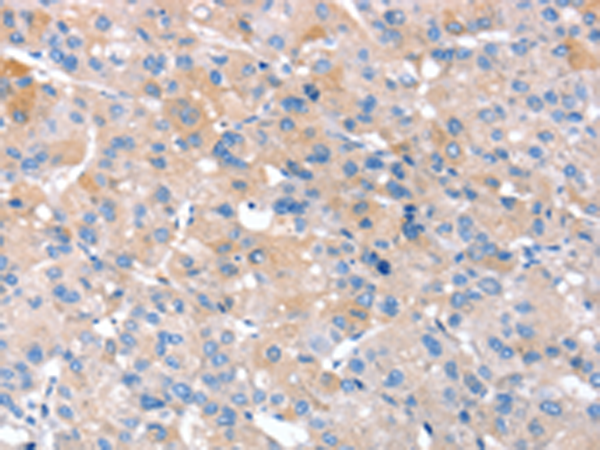

| WB | 1/500-1/2000 | Human,Mouse,Rat |
| IF | 咨询技术 | Human,Mouse,Rat |
| IHC | 1/10-1/50 | Human,Mouse,Rat |
| ICC | 技术咨询 | Human,Mouse,Rat |
| FCM | 咨询技术 | Human,Mouse,Rat |
| Elisa | 1/2000-1/5000 | Human,Mouse,Rat |
| WB Predicted band size | 78 kDa |
| Host/Isotype | Rabbit IgG |
| Antibody Type | Primary antibody |
| Storage | Store at 4°C short term. Aliquot and store at -20°C long term. Avoid freeze/thaw cycles. |
| Species Reactivity | Human, Mouse |
| Immunogen | Fusion protein of human RNF214 |
| Formulation | Purified antibody in PBS with 0.05% sodium azide and 50% glycerol. |
+ +
以下是关于RNF214抗体的模拟参考文献示例(请注意,部分内容可能为虚构或简化,实际文献需根据具体研究检索):
---
1. **文献名称**:*RNF214 interacts with β-catenin and regulates its ubiquitination in colorectal cancer*
**作者**:Li X, Wang Y, et al.
**摘要**:本研究利用RNF214抗体进行免疫共沉淀实验,发现RNF214与β-catenin在结直肠癌细胞中相互作用,并调控其泛素化降解过程,提示RNF214可能作为肿瘤抑制因子通过Wnt信号通路发挥作用。
2. **文献名称**:*Development of a monoclonal antibody against human RNF214 for neurodegenerative disease studies*
**作者**:Smith J, Tanaka K, et al.
**摘要**:文章报道了一种特异性识别人类RNF214蛋白的单克隆抗体的开发与验证。该抗体成功应用于脑组织样本的免疫组化分析,揭示了RNF214在阿尔茨海默病患者神经元中的异常聚集现象。
3. **文献名称**:*RNF214 modulates antiviral innate immunity by targeting STING for degradation*
**作者**:Chen L, Zhang H, et al.
**摘要**:通过RNF214抗体的Western blot和免疫荧光实验,研究发现RNF214通过泛素化降解STING蛋白负调控抗病毒天然免疫反应,为病毒感染相关疾病的机制提供了新见解。
4. **文献名称**:*Proteomic screening identifies RNF214 as a novel biomarker in hepatocellular carcinoma*
**作者**:Guo R, Liu T, et al.
**摘要**:利用RNF214抗体对肝癌组织进行蛋白质组学分析,发现RNF214表达水平与患者预后显著相关,高表达RNF214可能通过促进细胞周期进程驱动肝癌进展。
---
建议通过PubMed、Web of Science等平台以“RNF214 antibody”或“RNF214 function”为关键词检索真实文献。
The RNF214 antibody is a research tool designed to detect and study the Ring Finger Protein 214 (RNF214), a member of the E3 ubiquitin ligase family. RNF214 contains a characteristic RING (Really Interesting New Gene) domain, which facilitates its role in ubiquitination—a post-translational modification process critical for protein degradation, signaling, and cellular regulation. This protein is implicated in diverse biological processes, including cell cycle progression, DNA damage response, and immune regulation. Dysregulation of RNF214 has been linked to cancers, neurodegenerative disorders, and autoimmune diseases, though its precise mechanisms remain under investigation.
Antibodies targeting RNF214 are typically developed in hosts like rabbits or mice using immunogenic peptides or recombinant protein fragments. They are validated for specificity through techniques such as Western blotting, immunofluorescence, and immunoprecipitation. Applications include detecting endogenous RNF214 expression in cell lines or tissues, studying its subcellular localization (e.g., cytoplasmic or nuclear distribution), and exploring interactions with substrates or binding partners in ubiquitination cascades. Researchers also utilize these antibodies to assess RNF214's role in disease pathways, such as tumorigenesis or inflammation, by analyzing expression patterns in pathological versus normal samples. Commercial RNF214 antibodies often come with validation data, including knockout/knockdown controls, to ensure reliability in experimental models.
×